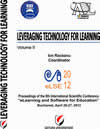ONLINE LEARNING FOR FOREIGN LANGUAGE TEACHERS: USING SOCIAL NETWORKING FOR CREATING AUTONOMOUS PERSONAL LEARNING NETWORKS
ONLINE LEARNING FOR FOREIGN LANGUAGE TEACHERS: USING SOCIAL NETWORKING FOR CREATING AUTONOMOUS PERSONAL LEARNING NETWORKS
Author(s): Anca Cristina COLIBABA, Anca Petrescu, Monica VladSubject(s): Education
Published by: Carol I National Defence University Publishing House
Keywords: Personal learning network; social networking; ICT tools for foreign language teachers
Summary/Abstract: This article presents the results of a research carried out in July-October 2011 throughout Europe for obtaining an overview on the usage of social networks (SNs) in the autonomous professional development of language teachers. The survey aimed at obtaining results in the following areas: most frequently used SNs, the components of professional development in which they are used, advantages and disadvantages of SNs, gender-based preferences, extent to which teachers have created a personal learning network (PLN) through the usage of SNs, extent of participation in training sessions / webinars, following tutorials as a result of involvement in a SN, self-assessment of the influence of SNs on professional development. The survey was answered by 174 teachers of mainly English, French, German, Italian, and Spanish as a foreign language. The research has been performed within the aPLaNet project. The aPLaNet project,co funded by the European Union (grant agreement no. 511460- LLP-2010-TR-KA2MP / 2010 / 4139), focuses on enabling foreign language teachers to create their own PLN and to become more familiar with ICT tools that can be used both for professional development (establishing contacts with other colleagues and experts, using new tools) and also for classroom activities with learners. The project also makes available for foreign language teachers a mentoring programme for improving ICT and social networking skills. Based on the results of this research, a series of guides, videos and papers have been created that show language educators the meaning of PLNs at a personal level. The recommendations and guidelines on which these instruments have been created are presented in the final section of the article.
Journal: Conference proceedings of »eLearning and Software for Education« (eLSE)
- Issue Year: 8/2012
- Issue No: 02
- Page Range: 391-396
- Page Count: 6
- Language: English

